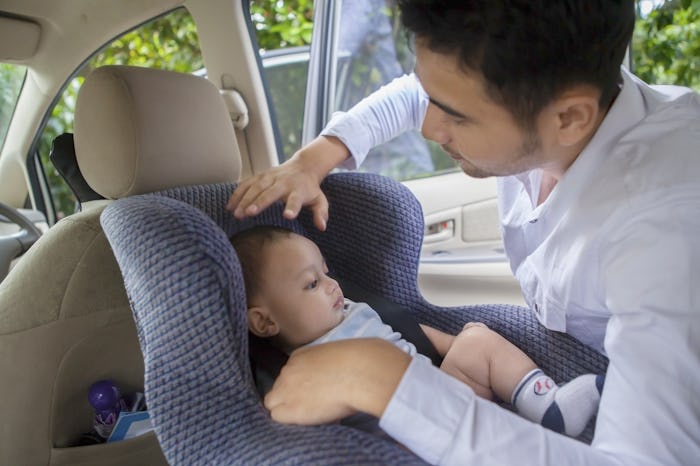Life

6 Common Car Risks For Newborns You Should Know
For many parents, the first few weeks with baby can be as exciting as they are intimidating. I remember when my partner and I brought our son home from the hospital, and I was overwhelmed by how fragile he seemed. Thankfully, the newborn stage doesn't last forever and babies are more resilient than you might think. With that said, however, there are still precautions to take to keep your little one safe. Driving, for instance, can be a bit nerve wracking, but knowing the common car risks for newborns will help ease your mind and get you prepared.
Whether you're a new parent or you're a veteran of the parenting scene, it's completely normal to want to keep your infant in an outfit made entirely out of bubble wrap for the first year of their life. But since that's neither safe nor financially practical, you'll likely have to seek out alternative options to ensure your baby's safety. One of the most important ways you can protect your newborn from potential health hazards is to know the common dangers of having your newborn in the car. Once you're aware of these, you'll be equipped with the knowledge to make informed decisions.
1Not Setting Time Limits
If you absolutely have to go on an extended road trip with your newborn, you'll have to break it up into chunks. As Allana Pinkerton, a Certified Child Passenger Safety Technician and Global Safety Advocate for Diono, tells Romper, you should, "take your baby out of their car seat at least every two hours on long rides." Not only will this likely time out well for their feedings, but it's a good way to catch any potential issues before they become bigger problems.
2Skipping Steps
"Safety risks include car seat placement and security — always rear-facing in the back seat and properly installed," Emily Long, a safety expert, tells Romper. The reason this is particularly dangerous for newborns is because, "their skulls and spines are still developing," Long further explains. So take the extra time to guarantee that their seat is correctly and securely fastened.
3Ignoring Exhaustion
It's basically a fact of life that parents of newborns are permanently tired. So what happens when you're exhausted but you have to go to the grocery store? "It's dangerous for parents to drive if they are drowsy — especially with a newborn in the car," safety expert Sage Singleton tells Romper. "They need to realize they're sleep-deprived and drive with caution." There's no prize for driving on little sleep, so don't push yourself if you're too tired to see straight.
4Sharing Space
If you have an older child in addition to your newborn, this tip is vital. "Consider placement of a newborn’s car seat next to a toddler’s car seat in the back seat," Sarah Tilton, Director of Consumer Advocacy for Britax, tells Romper. "You don’t want the toddler playing in ways that they think are fun, but could be potentially harmful while you are focused on your driving." Play it safe and keep some distance between them.
5Not Using Proper Resources
Even if you think you're an pro at putting in car seats, not having your installation work checked out can be dangerous for your newborn. As Baby Trend car seat technician Sabrina Zaremba tells Romper, "parents should get their car seat installed by a certified Child Passenger Safety (CPS) technician before heading to the hospital." If you're not sure where to find one of these experts, the National Child Passenger Safety Certification Program (NCPSCP) has a great resource list.
6Not Taking Angle Into Account
Newborns can't really do much for themselves, which is why parents have to be vigilant and attentive — at home and on the road. "Infants have no head and neck control," Lori Cawley, Child Passenger Safety Technician and Instructor, tells Romper. "If the proper angle of the car seat is not obtained, parents run the risk of potentially closing off the baby’s windpipe." Again, you can use the NCPSCP's list to find a qualified technician to check this out for you.